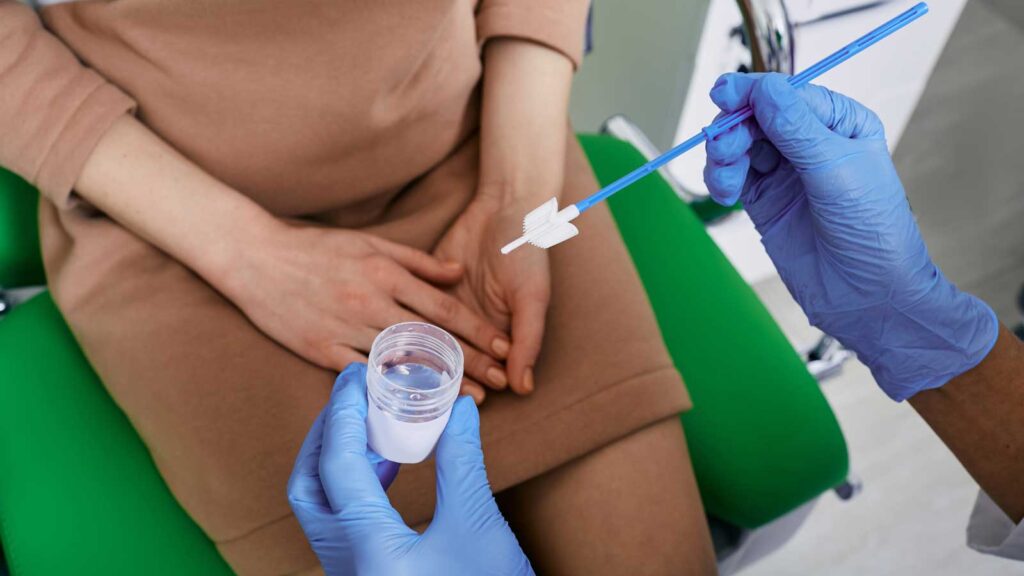
Many people walk into their gynecologist’s office assuming that a Pap smear will tell them whether or not they have any sexually transmitted infections (STI). This confusion is common and understandable, given that it’s a diagnostic pillar in women’s reproductive and sexual health.
But, as a procedure specifically designed to check on cervical tissue health, it may not be the best way to detect most STIs and catch them early on. This misconception may cause you to miss active infections, delaying necessary action even more.
If you’re unsure whether a comprehensive Pap smear test covers STI detection, let us help you clarify. In this blog, we’ll explore exactly what a Pap smear is designed to test for, clear up misconceptions, and determine whether it can detect STIs.
What a Pap Smear Actually Tests For in Your Body
A Pap smear examines the cells from the cervix to check for abnormal changes (cervical dysplasia) in them. Its purpose is to catch early signs of cervical cancer or precancerous conditions so that healthcare providers can treat them early and stop the progression.
Some Pap smears also include HPV testing, as certain strains of HPV (human papillomavirus) are closely linked to cervical cancer. However, it is essential to know that not every Pap smear automatically screens for HPV—your provider may need to order it separately. Additionally, while a Pap test might detect inflammation, it doesn’t tell us much about what’s causing it and won’t confirm any specific infections.
So, does a Pap smear test for STIs? No, it doesn’t. While it may detect HPV, it won’t screen for infections like chlamydia or gonorrhea. However, if it shows inflammation or abnormal cells, your provider might suggest a more comprehensive STI test to rule out infections.
For a complete picture of your sexual health, it’s best to request separate STI testing along with your Pap smear.
Why a Pap Smear Alone Cannot Detect Most STIs
A Pap smear and an STI test serve very different purposes, which is why a Pap smear alone won’t detect most infections. Pap smears focus on identifying abnormal cervical cells, while STI detection requires targeted tests for specific infections caused by bacteria, viruses, or parasites.
STIs That are Not Detected Through Pap Testing
Despite its value for screening cervical cancer, a Pap smear cannot detect infections like chlamydia, gonorrhea, herpes, syphilis, HIV, or trichomoniasis. These infections require dedicated testing methods to be identified. Even if some infections cause cervical inflammation, the Pap smear won’t reveal which infection is responsible.
Relying only on Pap smear results for your sexual health could leave certain STIs undiagnosed and untreated, increasing the risk of complications and transmission to others.
The Different Laboratory Methods Required for STI Detection
Each STI needs a specific diagnostic test tailored to the pathogen being investigated. For example, chlamydia and gonorrhea require nucleic acid amplification tests (NAATs), while herpes is detected through lesion swabs or bloodwork.
HIV testing involves blood or oral swabs, and syphilis also relies on blood tests. Trichomoniasis often needs a microscopic examination of vaginal fluid. These methods differ from the Pap smear, which focuses on cellular abnormalities, making comprehensive STI screening a separate but essential part of preventive care.
Common Misconceptions About Pap Smear Capabilities
Many people assume that a Pap smear automatically includes STI testing, which can lead to gaps in care. While Pap smears sometimes detect HPV, they do not screen for other common STIs unless your healthcare provider orders additional tests.
Another misconception is that a typical Pap result guarantees you’re STI-free, which isn’t true. It’s essential to clarify with your provider what tests are being performed during your visit. Understanding this distinction helps ensure you receive the right gynecological care services and proper screening for both cervical health and sexually transmitted infections.
When a Pap Smear Might Indicate STI Testing is Needed
Although a Pap smear isn’t designed to diagnose STIs, it can highlight issues that suggest the need for further STI screening. If your Pap results show unexpected abnormalities or inflammation, your provider may recommend additional testing to rule out infections. This step ensures that any underlying infections are treated before they lead to complications.
Here are some signs from Pap smear results that could prompt your provider to suggest further STI testing:
- Cervical inflammation without a clear cause.
- Abnormal cell changes linked to HPV infection.
- Unusual discharge or bleeding noticed during the exam.
- Pain during the Pap test that suggests possible infection.
- Recurring abnormal Pap results even after previous follow-ups.
If you experience any of these signs or have risk factors like multiple sexual partners, your provider may suggest additional STI testing along with your Pap smear. This approach ensures both your cervical health and sexual health are fully addressed.
Final Thoughts: Making Informed Decisions About Your Sexual Health Screening
A Pap smear is essential for monitoring cervical health, but it isn’t a substitute for comprehensive STI testing. To stay on top of your sexual health, you need both Pap smears and targeted STI tests based on your lifestyle and risk factors. Knowing what each test offers—and what it doesn’t—empowers you to take control of your well-being with confidence.
If you’re due for a Pap smear or need STI testing, Roswell ObGyn offers expert, compassionate care to guide you through every step. Schedule your appointment with us today to ensure your coverage.
The post Does a Pap Smear Test for Sexually Transmitted Infections? appeared first on Roswell OB/GYN,LLC.